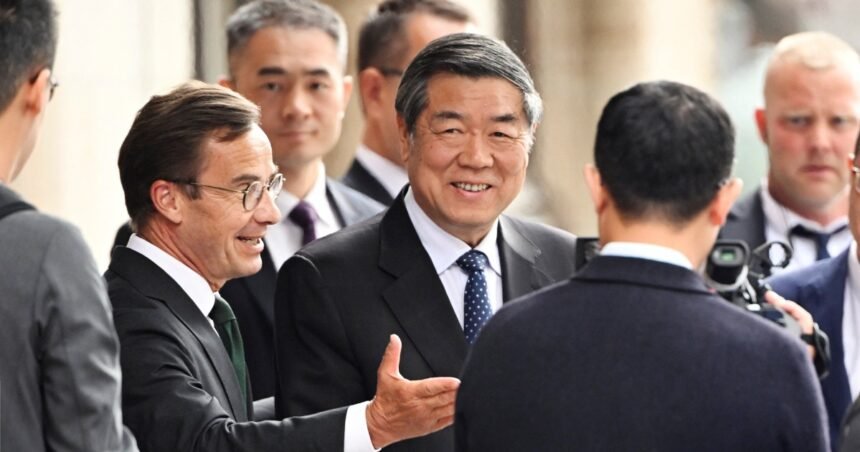Top US and Chinese economic officials met in Stockholm on Monday (July 28) for more than five hours of negotiations aimed at resolving longstanding trade disputes and extending their current tariff truce by another three months.
US Treasury Secretary Scott Bessent led the American delegation that arrived at Rosenbad, the Swedish prime minister’s office, on Monday afternoon. China’s Vice Premier He Lifeng also attended the talks, which come ahead of an August 12 deadline for reaching a durable tariff agreement with President Donald Trump’s administration.
The meetings follow preliminary deals struck in May and June to de-escalate weeks of tit-for-tat tariffs and supply cut-offs — including China’s halt of rare earth mineral exports, which are vital for US industries.
Negotiators left Rosenbad around 8 p.m. local time without commenting to the press. Talks are set to resume on Tuesday.
At a joint press conference in Scotland with UK Prime Minister Keir Starmer, Trump touched on the ongoing discussions, saying: “I’d love to see China open up their country.”
Without a deal, global supply chains could face renewed chaos from US tariffs snapping back to triple-digit levels, which analysts warn would amount to a virtual trade embargo.
US Trade Representative Jamieson Greer, who is attending the Stockholm meetings, told CNBC he did not expect a major breakthrough immediately.
“What I expect is continued monitoring of our current agreements, ensuring that critical minerals continue flowing, and laying the groundwork for more balanced trade,” Greer said.
The Stockholm talks come just a day after Trump’s new trade deal with the EU, which imposes a 15% tariff on most EU goods exports to the US.
Possible Trump-Xi Meeting
Trade analysts believe a 90-day extension of the tariff and export-control truce, originally struck in May, is likely. This would help prepare for a potential meeting between Trump and Chinese President Xi Jinping in late October or early November.
According to the Financial Times, the US has also paused some tech export curbs to avoid jeopardizing the talks and to support Trump’s push for a summit with Xi.
Meanwhile, in Washington, US senators from both parties plan to introduce new legislation targeting China over its human rights record and policies on Taiwan, which could complicate negotiations.
Sources told Reuters that Taiwan’s President Lai Ching-te will delay an August trip to the US, which his team had discussed with the Trump administration — avoiding a move that could have infuriated Beijing and disrupted the talks. China claims Taiwan as its own territory, while Taiwan rejects that claim and enjoys growing informal support from Washington.
Broader Trade Issues Still Unresolved
Previous US-China talks in Geneva and London this spring mainly focused on halting retaliatory tariffs and restoring the flow of rare earth minerals, Nvidia’s H20 AI chips, and other restricted goods. So far, the negotiations have not tackled deeper economic issues, such as:
- US complaints about China’s state-led, export-driven economy flooding global markets with cheap goods.
- China’s grievances over US national security export controls on advanced technologies.
“Geneva and London were really just about getting the relationship back on track so that both sides could eventually tackle the real underlying disagreements,” said Scott Kennedy, a China trade expert at the Centre for Strategic and International Studies in Washington.
Bessent has signaled he supports an extension and wants China to rebalance its economy toward domestic consumption, a long-standing US demand.
Analysts caution that the US-China trade dispute is far more complex than talks with other Asian nations and will take much longer to resolve. China’s dominant position in the supply of rare earth minerals and magnets — critical for military equipment and even everyday car parts — remains one of Beijing’s strongest bargaining chips.







